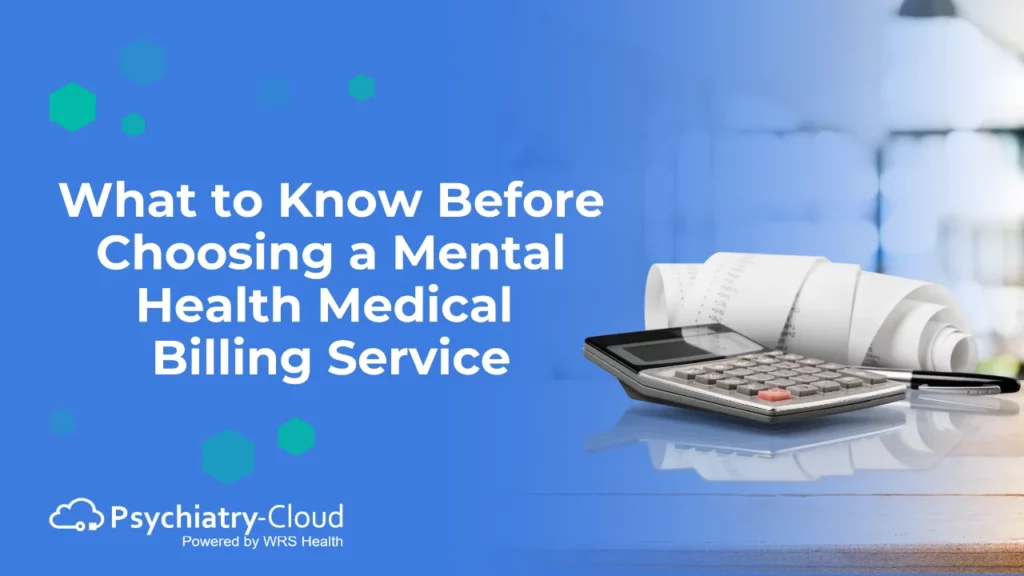Key Takeaways
- The right mental health medical billing service can improve revenue, reduce denials, and support practice growth.
- Look for behavioral health billing companies with automation, EHR integration, and strong customer support.
- Partnering with a behavioral health billing service designed for psychiatry helps you stay focused on care—not claims.
- Button up your billing processes with our Road to Higher Revenue guide.
If you’re launching or growing a psychiatry, therapy, or counseling practice, there’s one reality you’ll face early on: getting paid can be more complex than treating patients. Insurance rules shift constantly. Codes change. Claims bounce back for small clerical issues. And every denied claim adds up.
That’s why many providers partner with a dedicated mental health medical billing service instead of trying to manage it all internally. But not all behavioral health billing companies are created equal.
Whether you’re switching vendors or choosing your first billing partner, here’s what to consider before signing on.
Table of Contents
1. Look for Behavioral Health Billing Expertise
A general medical billing company may not cut it. Mental health and behavioral health have their own sets of rules, from time-based CPT coding to nuanced documentation requirements. You need a behavioral health billing service that understands these intricacies—because even small mistakes can lead to denied or delayed claims.
- Ask if the team includes certified coders with psychiatry, psychology, or therapy experience.
- Confirm they’re up to date with payer policies specific to behavioral health.
- Make sure they’re experienced with time-based CPT codes, current behavioral health codes, and modifier use for therapy billing.
- Make sure they support both individual and group therapy billing, as well as medication management for psychiatrists.
2. Make Sure It Integrates With Your EHR
Double data entry is a waste of time—and a risk for error. An effective mental health medical billing service integrates directly with your EHR or, better yet, is built into it.
Psychiatry-Cloud, for example, automatically generates a claim the moment a provider signs a note. No copying, no manual submission. Just review, click, and send. This seamless workflow saves hours each week and dramatically cuts down on rejections.
“When the practitioner creates a note, it automatically creates a claim. You just press a button, and the claim goes out,” says Diana Adcock, Billing Manager at CBHA
3. Prioritize Transparency and Reporting
You can’t manage what you can’t measure. A top-tier behavioral health billing company will give you full visibility into:
- Charges and collections
- Denial reasons and trends
- Claims aging
- Reimbursement by payer
Look for customizable reports and dashboards that help you track performance over time. Your billing partner should be just that—a partner. That means proactively flagging issues, not just processing claims.
4. Ask About Denial Management and Follow-Up
The right mental health medical billing service shouldn’t stop at claim submission. It should monitor rejections, correct errors, and re-file claims quickly and accurately.
At Psychiatry-Cloud, billing assistants and revenue advisors take on the follow-up work. Practices using our platform have seen:
A 65% decrease in claim rejections
A 70% increase in revenue
A 40% boost in charge capture
That’s the power of integrated, proactive billing support.
5. Evaluate Support, Training, and Responsiveness
Even the best billing software or service will require onboarding. You’ll want a partner that offers more than a portal login—they should provide responsive, ongoing support from people who understand your specialty.
Before you commit:
Ask how support requests are handled.
Confirm whether you’ll have a dedicated contact or advisor.
Request a demo or training session to see how user-friendly the tools are.
Beyond onboarding, consider how your billing partner adapts to your practice’s evolving needs. Will they provide refresher training if you bring on a new team member? Can they guide you through policy changes or payer updates? Ongoing education and live support can make the difference between a billing service that simply processes claims and one that drives your success proactively.
6. Understand the Fee Structure
Billing services typically charge a percentage of collections—usually between 4% and 9%. Be wary of anyone promising 2% rates without explaining what’s included. Low-cost providers often cut corners on follow-up, credentialing help, or reporting.
Make sure you know what you’re paying for:
- Does the fee include denial management?
- Are there charges for eligibility checks or statement printing?
- Is onboarding included?
- Do they offer credentialing support for new providers or re-credentialing for existing ones?
The cheapest option upfront may cost more long term if claims fall through the cracks.
7. Consider Growth and Scalability
As your practice grows, will your billing partner scale with you?
- Can they handle multiple providers or locations?
- Do they support telehealth-specific billing?
- Is there a plan for credentialing new clinicians?
Even if you’re a solo provider today, your needs may change tomorrow. A strong mental health medical billing service should support that growth without forcing you to change systems or retrain your team. Look for flexible platforms and service agreements that won’t penalize you for expansion—and that offer the infrastructure to support a multi-provider model, group therapy, or diversified care offerings down the line.
Choose a Mental Health Billing Partner, Not Just a Vendor
Your billing service should do more than submit claims. It should reduce administrative work, help you capture every dollar you earn, and provide insights you need to grow.
Psychiatry-Cloud is more than a behavioral health billing service. It’s a full practice management solution built for psychiatrists, psychologists, therapists and mental health professionals. With integrated EHR, virtual billing assistants, and dedicated RCM advisors, you get the support you need to stay focused on care—instead of on paperwork.











